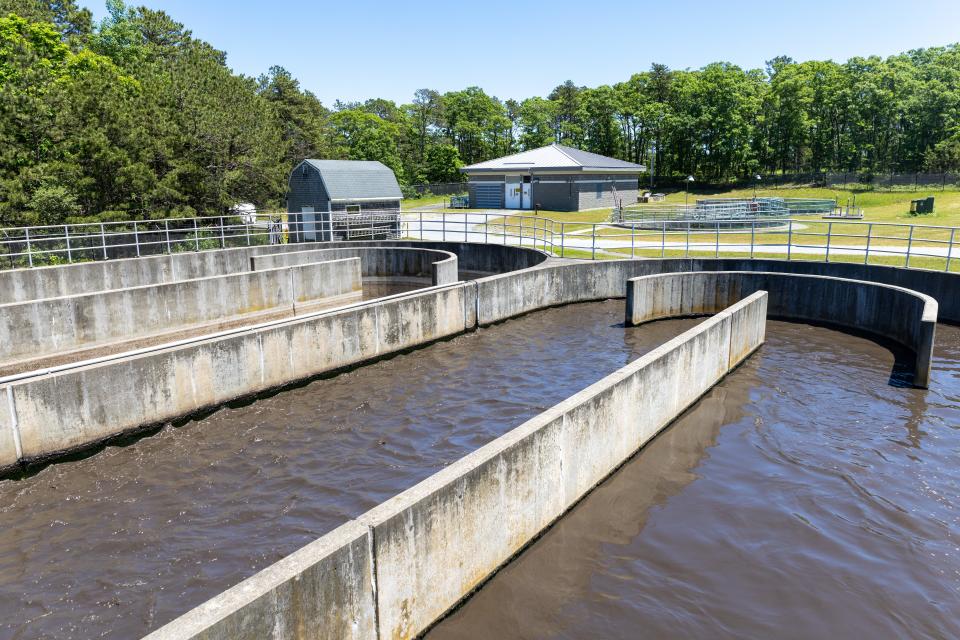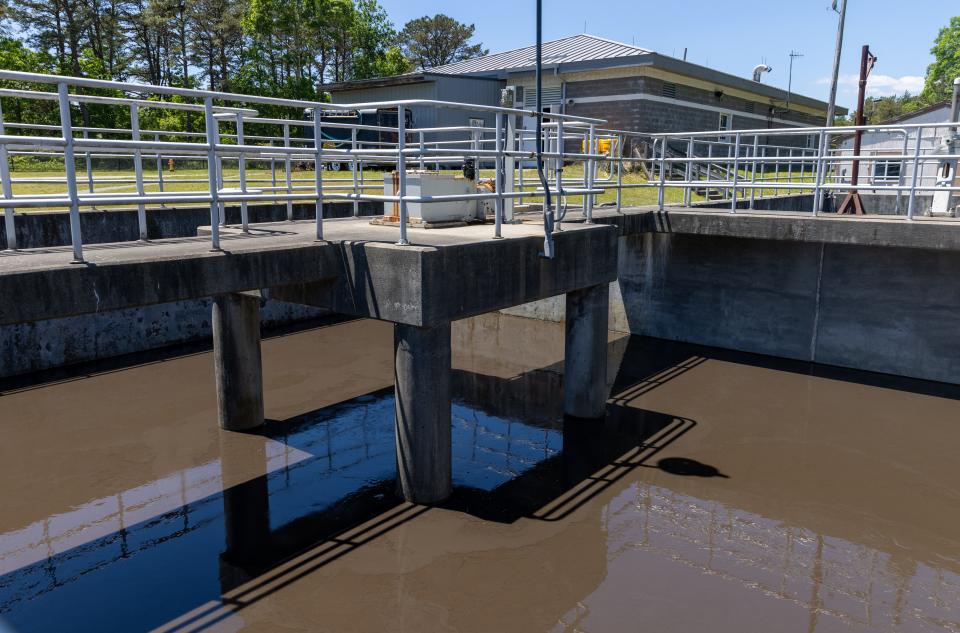Cape Cod military base wastewater plant ownership in flux, with potential to help towns
Editor's note: This story was updated July 20, 2023 to correct a job title.
Ownership of an underused sewage treatment plant on Joint Base Cape Cod is currently in the process of being transferred to a private investment firm that aims to use it to handle regional wastewater needs.
In June 2022, the U.S. Air Force began the transfer of ownership of the base’s sewer treatment plant — currently operating at 40% of its capacity — to Converge Partners LLC of Quincy. The move could save money for local towns, who would be using infrastructure that’s already built instead of building their own systems.
One such town that has expressed interest is Sandwich.
“I think most people know, certainly the Select Board knows, that wastewater is the most important environmental and economic issue facing Sandwich for at least the next 50 years,” Sandwich Town Manager George "Bud" Dunham said in a Thursday meeting in Sandwich.

In an interview after the meeting, Dunham said connecting the town's sewer lines to the base’s wastewater treatment plant is cheaper and more environmentally sound than using septic tanks — which are a leading contributor to nitrogen pollution.
“It's a lot cheaper and more successful to be on a sewer system in the long run,” he said. “The septic systems that are being touted don’t meet the requirements of Title 5 that people would have to switch to. It’s been proven that those systems don’t even work.”
But it won’t be easy.
There are a number of environmental concerns at play if the deal is to realize success — ranging from PFAS, or forever chemicals, and nitrogen pollution, to infrastructure upgrades and securing proper permits.
PFAS, or polyfluoroalkyl substances, are "widely used, long-lasting chemicals, components of which break down very slowly over time," according to the the US. Environmental Protection Agency.
“The concerns are all valid,” said Matthew Kennedy, founder and managing partner at Converge, an investment company seeking to acquire assets that provide essential services to state and local governments. “But we need to find a solution that works with the Upper Cape in terms of water quality concerns that include PFAS, as well as phosphorus, nitrogen, and others.”
Anni Loughlin, federal facilities Superfund sites supervisor for the EPA, said PFAS chemicals have been found at the Joint Base Cape Cod wastewater plant.
“There is PFAS contamination in the infrastructure associated with that wastewater treatment plant,” Loughlin said. “We don't really know a lot about the full nature and extent of the PFAS contamination, but we know that it's migrated into the sewer system, to the wastewater treatment plant, through the facility, and in the filtration beds.”
What is Joint Base Cape Cod?
The base, in the western part of Cape Cod, hosts five military commands, including the Massachusetts Army National Guard at Camp Edwards, and the Massachusetts Air National Guard, which maintains and operates the wastewater plant, at Otis Air Base.
The base includes parts of Mashpee, Bourne and Sandwich and abuts the town of Falmouth.
Joint Base Cape Cod was designated a Superfund site in 1989 under the Comprehensive Environmental Response, Compensation and Liability Act. A Superfund site is a site contaminated with hazardous waste that poses a threat to human health and the environment.
Several measures have been taken by the Massachusetts National Guard to clean up the waste across Joint Base Cape Cod, investing $1.2 billion in cleanup programs addressing groundwater and soil contamination.
U.S. Air Force is responsible for PFAS cleanup at the base wastewater plant
For the wastewater treatment plant specifically, despite the transfer of ownership to Converge, Loughlin said, the Air Force is responsible for PFAS coming from the wastewater treatment plant.
“It's still the Air Force’s responsibility to address it, wherever that contamination goes and poses a risk to human health and the environment,” she said. “That's what they're required to address.”
In an email to Loughlin obtained in a packet for the meeting in Sandwich Thursday, Vice Commander of 102nd Intelligence Wing of the Air National Guard Col. Timothy Gordon said the Air National Guard is aware of the PFAS contamination at the base wastewater plant.
“Specifically concerning was a lack of clarity on whether this issue will impact the connection of municipal wastewater lines" to the base plant, using the existing infrastructure and permit limits, Gordon said in the email to Loughlin.
Loughlin said in her interview with the Times that the EPA, generally, proposed regulating PFAS by establishing nationwide legally enforceable levels for drinking water, but no regulations have been finalized.
The Massachusetts National Guard, including the Air National Guard, did not respond to the Times' questions regarding their responsibility to address the PFAS contamination at the plant.
Considerations exist for municipalities to connect to the base wastewater plant
There are measures every party should consider when deciding whether to use the base wastewater plant under the new ownership of Converge, Loughlin said Friday, but it does “not necessarily” mean municipalities should abstain completely.

The deal with Converge would be a big step in addressing what many are calling a critical issue for the Upper Cape, three Sandwich town officials said as well as Kennedy and Andrew Gottlieb of the Association to Preserve Cape Cod. It might also prove to be a cost-effective option for towns, who would be using a treatment system that’s already in place.
Centralizing wastewater treatment by connecting municipal lines to the base facility could also go a long way in monitoring and decreasing nitrogen pollution from septic systems in nearby towns.
“We saw an opportunity to solve a need for Joint Base Cape Cod, as well as the Upper Cape community,” Kennedy said. “Needing to find a new solution, a solution that reduces that … pollution, is necessary for the Cape to continue to be what we all know and love.”
Kennedy is a member of the extended family of former President John F. Kennedy, who had a home in Hyannisport and championed the creation of the Cape Cod National Seashore, among other initiatives to protect the environment.
Transfer of base wastewater plant ownership to Converge still in progress
The Air Force decided to transfer ownership of the wastewater facility as a part of the divestment process called Base Realignment and Closure, Kennedy said. Although approved in May 2022, he said full operating ownership has not yet been transferred to Converge.
The Massachusetts Air National Guard has completed an exchange agreement with Converge — which sets the divestment process in motion, according to Gordon.
In 2022: Joint Base Cape Cod sewage treatment plant could help Upper Cape communities, officials say
“This agreement contains a number of prerequisites before the assets can actually be transferred. These prerequisites, which include rights of access documents and a utility service contract, are currently being worked by the Air Force and the National Guard Bureau,” Gordon said in an email Tuesday to the Times. “Once these documents are complete, the transfer of assets will be finalized.”
Kennedy said once the Air Force and National Guard have processed the transaction, Converge can begin operating the plant.
“That contract, initially, was supposed to be completed a year ago and still is yet to be completed,” Kennedy said. “We're waiting and we hope that it is completed soon.”
In the email to Loughlin, Gordon said the deal was contingent on Converge’s abilities to service municipal wastewater needs in a sustainable manner. Gordon also expressed concern in the email about pollution and contamination at the base wastewater treatment plant.
The Air National Guard answered the Times by email on Saturday but did not answer questions about why it has not completed the service contract.
Issue of liability raised with wastewater connections for towns
In the email exchange with Gordon, Loughlin said connecting the base wastewater system to municipal lines like Sandwich’s could result in towns being subject to liability under the Comprehensive Environmental Response, Compensation and Liability Act.
CERCLA, or the Superfund law, is a wide-ranging provision that holds parties legally responsible for the presence of hazardous substances at a site, Loughlin said in an interview.
“Any one potentially responsible party may be held liable for the entire cleanup of the site,” Loughlin said, referring to the Joint Base Cape Cod wastewater plant. “Is it usually applied that strictly? No, but we, the Superfund program, wanted to raise this issue to the impacted parties and just let them know that this was an issue.”
Biggest challenge for joint venture with towns and base could be wastewater discharge permits
If municipalities like Sandwich connect their sewer lines to the base plant, questions could arise with Converge securing the proper discharge permits.
Discharge permits are issued based on regulations specifying where treated wastewater can be safely discarded.
David Mason, program coordinator for wastewater operations for Sandwich, said Thursday after the meeting, that securing treated wastewater permits would be the “biggest challenge.”
“You can have a wastewater treatment plant, but you need a place to discharge it,” Mason said. “If you don’t have a place to discharge it, what’s the point?”
The surrounding areas have become more difficult to release wastewater discharge into over the last four years, said Gottlieb, the executive director of the Association to Preserve Cape Cod, due in part because of hypoxic water — water depleted of oxygen — in Cape Cod Bay.
It is enormously complicated getting a discharge permit, Gottlieb said. “Not only do you have to meet the permitting standards, you can’t make existing conditions worse.”
Gottlieb, a former Select Board member in Mashpee during a time when it was considering a wastewater deal with Converge, said if the plant were to service a wider regional network of towns, significant upgrades to the existing infrastructure would be needed. He said that would also include larger permitting options.
“While expansion of the treatment plant, in and of itself, is not that technologically complex or particularly difficult to do, the issues associated with expanding the discharge are vastly more complex,” Gottlieb said. “You have the potential to require new federal permits that are otherwise not applicable in that current discharge capacity.”
Kennedy said he is aware of the hurdles but feels the regional need for wastewater facilities is a crucial goal that needs to be addressed, and that the underutilized base plant will help.
“There’s some permitting discharge that is not being fully utilized,” he said. “That’s what we got to work through from a local permitting perspective over the next little while.”
Walker Armstrong reports on all things transportation and the Joint Base Cape Cod military base. Contact him at WArmstrong@gannett.com. Follow him on Twitter: @jd__walker.
Thanks to our subscribers, who help make this coverage possible. If you are not a subscriber, please consider supporting quality local journalism with a Cape Cod Times subscription. Here are our subscription plans.
This article originally appeared on Cape Cod Times: Cape military base plant may treat town sewage: PFAS, discharge issues

